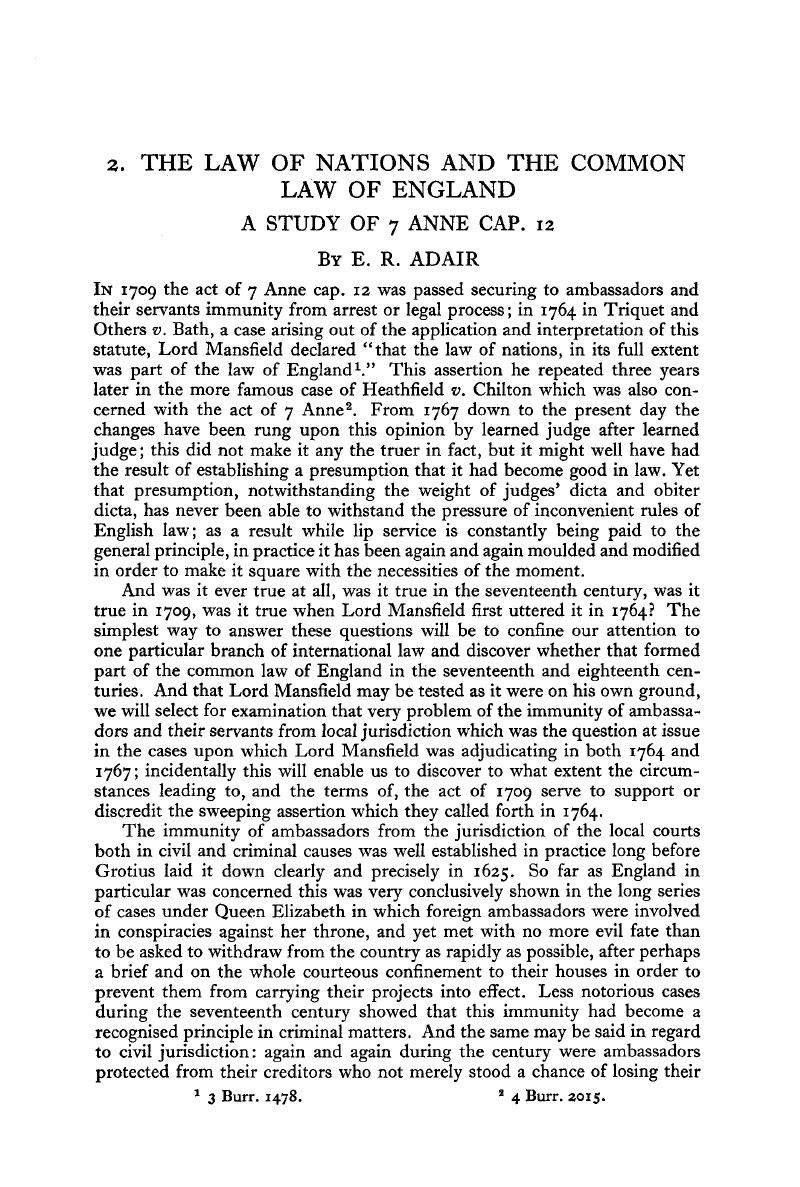Published online by Cambridge University Press: 20 December 2011

page 290 note 1 3 Burr. 1478.
page 290 note 2 4 Burr. 3015.
page 291 note 1 Cal. of S.P. Ven. 1625–26, nos. 497, 507, 544, pp. 350, 361, 383, March 13, 20, April 11, 1626, Venetian ambassador in London to Doge. Cal. of S.P. Dom. Charles I, XXIII. 59, March 24, 1626.
page 291 note 2 Dasent, Acts of the Privy Council, XX. 310, Feb. 28, 1590.
page 291 note 3 Wright, Queen Elizabeth and her Times, II. 37–42. Dasent, Acts of the Privy Council, IX. 229, Nov. 7, 1576.
page 292 note 1 E.g. in the case of the Venetian ambassador who would not pay his debts (Acts of the Privy Council, 1615–16, p. 291, Sept. 26, 1615).
page 292 note 2 Lords' Journals, IV. 317, July 17, 1641. Cal. of S.P. Ven. 1640–42, no. 236, pp. 189–93, Venetian ambassador in England to Doge, Aug. 9, 1641.
page 292 note 3 Lords' Journals, IV. 435–37, Nov. 12, 1641. Cal. of S.P. Ven. 1640–42, no. 283, pp. 244–45, Venetian ambassador to Doge, Nov. 22, 1641.
page 292 note 4 Lords' Journals, IV. 382, 389–90, Aug. 30, Sept. 6, 1641.
page 292 note 5 Lords' Journals, IV. 564, Feb. 5, 1642.
page 293 note 1 Commons' Journals, III. 667, Oct. 16, 1644. Lords' Journals, VI. 564, 591, 701; VII. 7, 21, 48.
page 293 note 2 Cal. of S.P. Dom. 1653–54, pp. 281–82, Dec. 2, 1653.
page 293 note 3 S. R. Gardiner, History of the Commonwealth and Protectorate, III. 79–81. Cal. of S.P. Dom. Interregnum, XLI, Nov. 23, 26, 1653; XLII, Dec. 6, 1653; LXV, Jan. 16, 1654; LXVI, Feb. 24, 1654; LXXI, May 4, 8, 1654; LXXII, June 19, 23, 1654.
page 293 note 4 Cal. of S.P. Dom. Interregnum, c, Sept. 14, 1655; CI, Oct. 12, 1655; CXXV, March 27, 1656.
page 294 note 1 There are several ways of spelling this name: Matvyeev, Matueow.
page 294 note 2 Luttrell, Brief Relation of State Affairs, VI. 330, 331, 364, 407, 461. Phillimore, International Law, II. 235–36. J. B. Scott, Cases on International Law, pp. 286–87.
page 294 note 3 See Seacomb v. Bowlney in 1743 (I Wils. K.B. 20). Heathfield v. Chilton (4 Burr. 2017) in 1767, and Hopkins v. de Robeck (3 T.R. 79) in 1789 make it clear that the fact that an ambassador's servant is not so registered does not deprive him of his immunity; while Hopkins v. De Robeck and Triquet v. Bath (3 Burr. 1478) show that such immunity is enjoyed by all the bona fide members of the ambassador's suite.
page 295 note 1 Satow, Diplomatic Practice, I. 295–300.
page 295 note 2 In the recent case of Musmann v. Engelke a majority judgment delivered by Lord Justice Scrutton held that the evidence of the Attorney-General speaking for the Foreign Office was insufficient to show that the defendant was a member of the German Embassy and that therefore he must appear and submit to examination as to his position. This is a very dubious decision and the Master of the Rolls dissented from it with some justice, but it well illustrates the unwillingness of the ordinary courts to sacrifice one iota of their competence (The Times, June 24, 1927).
page 295 note 3 Blackstone, Commentaries, 2nd ed. I. 256–57.
page 296 note 1 Stowell and Munro, International Cases, Peace, p. 4.
page 296 note 2 Cases. T. Talbot, 281. In the course of his judgment Lord Talbot stated that 7 Anne cap. 12 was “only declaratory of the antient universal jus gentium.” This is perfectly sound, but it is a very different statement from that made by Mansfield.
page 296 note 3 Blackstone, Commentaries, 2nd ed. I. 256–57.
page 297 note 1 3 Burr. 1480.
page 297 note 2 Art. 130.
page 297 note 3 E.g. in the case of Gallatin's coachman who was arrested within the precincts of the embassy there is no suggestion that in this connexion the court was acting illegally. (See Satow, Diplomatic Practice, I. 296–99.)